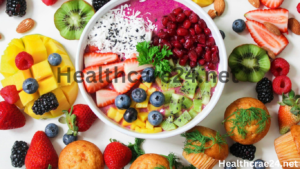
Contents
1.Introduction
2.Importance of a Strong Immune System
3.Nutrient-Rich Foods for Immune Health
3.1.Leafy Greens and Vegetables
3.2.Citrus Fruits
3.3.Berries
3.4.Garlic and Onions
3.5.Probiotics
4.Immune-Boosting Supplements
4.1.Vitamin C
4.2.Vitamin D
4.3.Zinc
4.4.Elderberry
4.5.Echinacea
5.Lifestyle Practices for Immune Support
5.1.Regular Exercise
5.2.Adequate Sleep
6.Stress Management
6.1.Hydration
7.Herbal Remedies for Immunity
7.1.Turmeric
7.2.Ginger
7.3.Green Tea
7.4.Elderflower
8.The Role of Water in Immune Function
9.Combining Foods and Supplements for Maximum Benefit
10.Conclusion
Introduction
An immune system that is strong is essential in the modern society where health is of the utmost importance. Your immune system’s potency determines how well your body fights against diseases and infections. Although genetics are a factor lifestyle decisions like nutrition and supplements can have a big impact on immunity.
Importance of a Strong Immune System
In addition to aiding in the defense against common colds and the flu a robust immune system is essential in preventing more serious illnesses like cancer and autoimmune diseases. You may strengthen your body’s natural defenses by forming healthy habits and ingesting foods and substances that strengthen the immune system.
Nutrient-Rich Foods for Immune Health
Leafy Greens and Vegetables
Rich in vitamins and antioxidants that enhance immune function dark leafy greens like kale and spinach are a great source of nutrition. These veggies are high in beta-carotene vitamin C and vitamin E all of which are important for boosting immunity.
Citrus Fruits
Citrus fruits—like grapefruits, oranges and lemons—are well known for having a high vitamin C concentration. White blood cells are vital for battling infections and their formation depends on vitamin C.
Berries
Antioxidants found in berries like raspberries, blueberries and strawberries help shield cells from damage brought on by free radicals. They also have fiber and vitamin C which are good for immunity and general health.
Garlic and Onions
Onions and garlic are not only tasty additives to food but they are also powerful immune system builders. They include sulfur-containing chemicals that may help prevent infections due to their antibacterial qualities.
Probiotic
Probiotic-rich foods like kefir, sauerkraut, and yogurt help to maintain a healthy gut microbiome. For the immune system to work as best it can the gut flora must be in balance since it controls inflammation and promotes the growth of immune cells.
Immune-Boosting Supplements
Vitamin C
Supplementing with vitamin C is a traditional way to improve immune function particularly during the cold and flu season. Vitamin C has been demonstrated in studies to shorten the duration and lessen the severity of respiratory infections.

Vitamin D
A deficit in vitamin D has been associated with a higher risk of autoimmune disorders and infections. Taking vitamin D supplements may improve immunological function especially in those with low levels.
zinc
One mineral that is essential for both wound healing and immunological function is zinc. It aids in the activation of T-cells which are in charge of locating and eliminating contaminated cells.
Elderberry
Supplements made from the fruit of the elderberry plant are thought to possess antiviral qualities. They are frequently used to reduce how long colds and the flu last.
Elderberry
A popular herbal medicine for treating and preventing colds and respiratory infections is echinacea. It is believed to lessen inflammation and boost immunity.
Lifestyle Practices for Immune Support
Regular Exercise
It has been demonstrated that moderate exercise improves immune function by lowering inflammation and increasing circulation. Try to get in at least 30 minutes of exercise most days of the week.
Adequate Sleep
Sustaining a robust immune system requires getting adequate sleep. Try to get 7–9 hours of good sleep per night to give your body time to recover and rejuvenate.
Stress Management
Prolonged stress can impair immunity and increase vulnerability to disease. Engage in stress-relieving activities like yoga, meditation and deep breathing.
Hydration
Immune system and general health depend on maintaining adequate hydration. To maintain your cells operating at their best and assist your body rid itself of pollutants make sure you drink enough of water throughout the day.
Herbal Remedies for Immunity
Turmeric
Curcumin, a substance found in turmeric has potent anti-inflammatory and antioxidant qualities. You may support immune function by taking supplements or including turmeric in your diet.
Ginger
For decades, ginger has been utilized as an all-natural cure for colds and influenza. Its antibacterial and anti-inflammatory qualities can support a stronger immune system.
Green Tea
Green tea is rich in antioxidants called catechins which have been shown to enhance immune function and protect against infections. Enjoy a cup of green tea daily to reap its benefits.
Elderflower
Elderflower is another herbal remedy that has been used for centuries to boost immunity. It has antiviral and anti-inflammatory properties and can be consumed as a tea or in supplement form.
The Role of Water in Immune Function
As water aids in the transportation of nutrients to cells and the removal of toxins from the body maintaining hydration is essential for immune system support. Try to consume eight glasses of water or more if you live in a hot area or are an active person.
Combining Foods and Supplements for Maximum Benefit
Focus on eating a balanced diet full of fruits, vegetables, whole grains and lean proteins to optimize the immune-boosting effects. When necessary, take supplements containing important nutrients like zinc, vitamin D, and C, particularly during periods of high stress or illness.
Conclusion
It is possible to increase immunity naturally by combining lifestyle changes nutritional supplements and a nutritious diet. You may fortify your body’s defenses and maintain your health all year round by including immune-boosting foods, supplements and practices into your daily routine.
FAQs
Are there any side effects of immune-boosting supplements?
Although most people who take immune-boosting supplements don’t have any problems, some people may have modest side effects including unsettled stomachs or allergic responses. It’s critical to adhere to dose guidelines and get medical advice from a specialist if you have any concerns.
Can I boost my immune system quickly?
While there’s no magic pill for instant immunity, adopting healthy habits like eating a nutrient-rich diet, getting enough sleep, and managing stress can help strengthen your immune system over time.
Are there any foods I should avoid for immune health?
Certain foods, such as processed snacks, sugary drinks, and excessive alcohol, can weaken the immune system and should be consumed in moderation.
Can exercise improve immune function?
Yes, regular exercise has been shown to enhance immune function by promoting circulation, reducing inflammation, and supporting the production of immune cells.
Should I take immune-boosting supplements year-round?
While some people may benefit from taking immune-boosting supplements regularly, others may only need them during certain times of the year or when under increased stress or illness.
